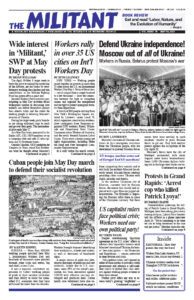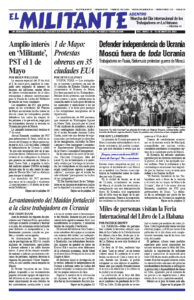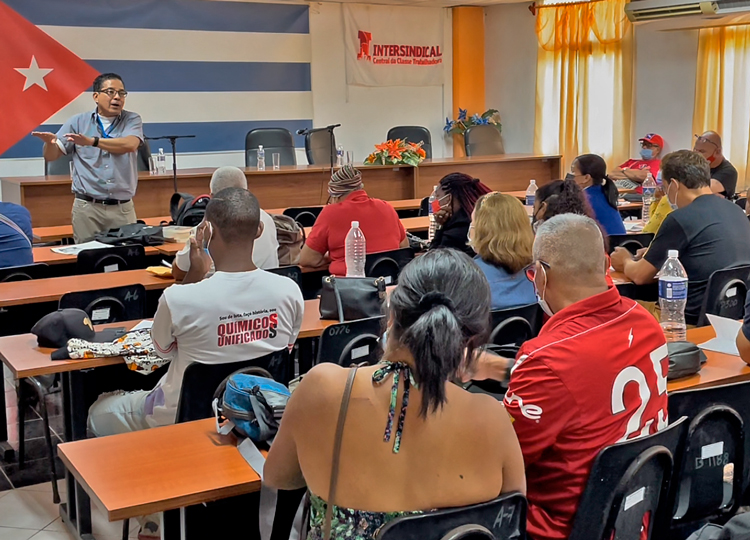HAVANA — “Since you haven’t had a chance to attend the book fair during your stay here, we decided to bring a piece of it to you,” said Odalys Cárdenas of the Central Organization of Cuban Workers (CTC). She was speaking April 26 to a group of 50 visiting trade unionists from Brazil, Colombia, Panama and Uruguay who were taking a weeklong course sponsored by the CTC’s Education Department and the World Federation of Trade Unions.
Cárdenas introduced Róger Calero and Rachele Fruit from the Socialist Workers Party and Philippe Tessier from the Communist League in Canada, who were volunteering at the Pathfinder Books stand at the Havana International Book Fair. They talked about their experiences as socialist workers in the U.S. and Canada, and about some of the books Pathfinder brought to the fair, which take up lessons from the struggles of working people worldwide, including Cuba’s socialist revolution, and offer a revolutionary working-class perspective.
In particular, Calero focused on the two books Pathfinder presented with panels at the book fair — The Jewish Question: A Marxist Interpretation and Labor, Nature, and the Evolution of Humanity: The Long View of History. He also described these books by SWP National Secretary Jack Barnes: The Turn to Industry: Forging a Proletarian Party; Tribunes of the People and the Trade Unions; and Malcolm X, Black Liberation, and the Road to Workers Power.
The unionists were eager to browse through the books and discuss developments in the class struggle in the U.S. and Canada, the worldwide economic and social crisis of capitalism, Moscow’s invasion of Ukraine, and resistance by working people to attacks by bosses and their governments. During the exchange, which continued over lunch, they and some workers at the CTC center purchased some 80 books.
Aldemar González, a leader of Sintraemsdes, a public employees union in Colombia, pointed to recent assassinations of Colombian trade union leaders by the thugs of big landowners, mining companies and drug lords. “We’ve organized actions together with farmers and indigenous communities, who face the same enemies,” he said.
He found of particular interest the four-volume series containing lessons of the strikes and organizing battles waged by the Minneapolis Teamsters in the 1930s. Those experiences include how the trucking workers, with a class-struggle leadership, defeated fascist thugs backed by local bosses, and how they organized unemployed workers and forged an alliance with working farmers. He bought the series, written by Farrell Dobbs, a central leader of these battles, who became a leader of the Socialist Workers Party.
Irán Botello, of the National Workers Federation of Panama (CNTP), said they are engaged in a fight against government moves to increase the retirement age and workers’ minimum-required contribution to pensions. Funding for medical services provided by Panama’s social security institute is completely inadequate to meet workers’ needs. “The amount we pay is going up, and it takes a long time to get service even if you qualify,” he said.
“Workers in Canada face similar attacks on our wages, benefits and job conditions,” said Tessier, a train conductor at Canadian National. He described some of the discussions about how to fight effectively that Communist League members there have with fellow workers.
Tamara González, a CTC course facilitator, was looking at a display of photos the socialists brought of strikes and other recent working-class struggles in the U.S., Canada and elsewhere. One thing that particularly caught her attention was a quote stating that to defend their interests workers need not only to form unions, but to break with the political parties of the capitalist bosses and organize their own labor party. “This is something we will have to discuss more in the training course,” she said.


